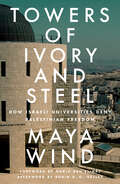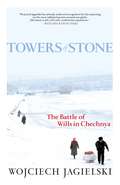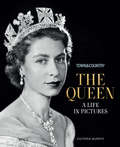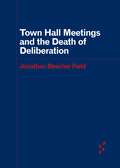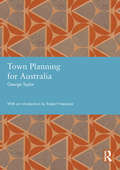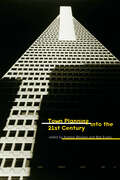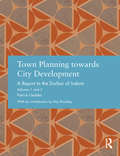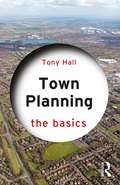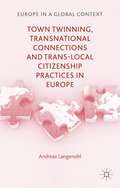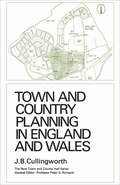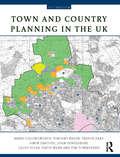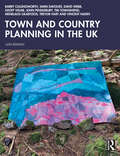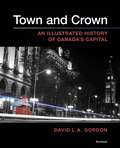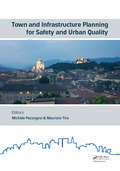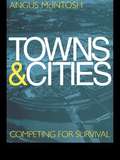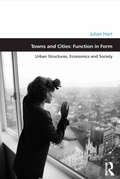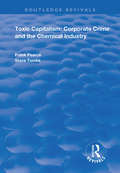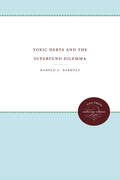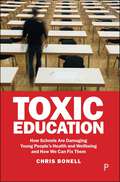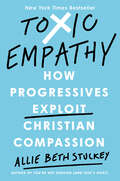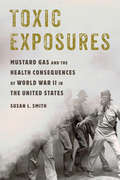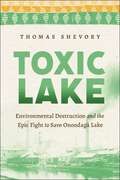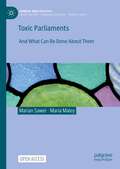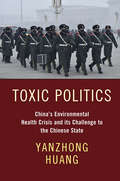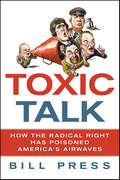- Table View
- List View
Towers of Ivory and Steel: How Israeli Universities Deny Palestinian Freedom
by Maya WindHow Israeli universities collaborate in Israeli state violence against PalestiniansIsraeli universities have long enjoyed a reputation as liberal bastions of freedom and democracy. Drawing on extensive research and making Hebrew sources accessible to the international community, Maya Wind shatters this myth and documents how Israeli universities are directly complicit in the violation of Palestinian rights.As this book shows, Israeli universities serve as pillars of Israel's system of oppression againstPalestinians. Academic disciplines, degree programs, campus infrastructure, and research laboratories all service Israeli occupation and apartheid, while universities violate the rights of Palestinians to education, stifle critical scholarship, and violently repress student dissent. Towers of Ivory and Steel is a powerful expose of Israeli academia&’s ongoing and active complicity in Israel&’s settler-colonial project.
Towers of Stone: The Battle of Wills in Chechnya
by Wojciech Jagielski Soren A. GaugerIn Towers of Stone, award-winning Polish reporter Wojciech Jagielski brings into focus the tragedy of Chechnya, its inhabitants, and the war being waged there by a handful of desperate warriors against a powerful and much more numerous army. Jagielski's narrative is told through the lens of two men: Shamil Basaev, a hero to some, a dangerous warlord to others; and Aslan Maskhadov, a calculating and sober politician, who is viewed as a providential savior by some of his compatriots and a cowardly opportunist by the rest. Caught up in a war to which they owe everything and without which they could not live, the two fighters face enemy forces--and one another--in protean conflicts that prove hard to quell. Viewing the two men's personal story as a microcosm of the conflict threatening to devour a land and its peoples, Jagielski distills the bitter history of the region with forceful clarity.
Town & Country The Queen: A Life in Pictures
by Victoria MurphyA pictorial celebration of Queen Elizabeth II&’s magnificent reign Since she succeeded to the throne in 1952, Queen Elizabeth II has become respected, celebrated, and beloved around the world. This stunning collection of powerful images illustrates her storied reign in all its glory. More than 300 extraordinary photographs, along with insightful commentary by the royal journalist Victoria Murphy, showcase the significant, historic, and intimate moments throughout the Queen&’s life, first as a young princess and then as the longest-reigning British monarch. The book covers her war years in service; her marriage to Prince Philip; her coronation—the first to be televised; her extensive official travels around the world; the glittering diplomatic occasions and encounters with world leaders, dignitaries, and celebrities; the pomp and pageantry of ceremonial events; her role as a fashion icon; her relationships with her parents, King George VI and the Queen Mother, and her sister, Princess Margaret; the birth of her son and heir to the throne Prince Charles; family life with her four children and eight grandchildren, as well as her beloved dogs and horses; and the growing role of Prince William and his wife, the Duchess of Cambridge, as they support the Queen in her public duties. Shown here too are the Crown Jewels as well as the Queen&’s personal jewelry collection; a look at the royal palaces and residences; and portraits from the stunning royal weddings that have so enchanted the world. Throughout her reign, with a combination of star power and a profound sense of duty, Queen Elizabeth II has steered the British monarchy into the modern era with supreme style and grace. She is truly a queen for all ages.
Town Hall Meetings and the Death of Deliberation (Forerunners: Ideas First)
by Jonathan Beecher FieldTracing the erosion of democratic norms in the US and the conditions that make it possible Jonathan Beecher Field tracks the permutations of the town hall meeting from its original context as a form of democratic community governance in New England into a format for presidential debates and a staple of corporate governance. In its contemporary iteration, the town hall meeting models the aesthetic of the former but replaces actual democratic deliberation with a spectacle that involves no immediate electoral stakes or functions as a glorified press conference. Urgently, Field notes that though this evolution might be apparent, evidence suggests many US citizens don&’t care to differentiate. Forerunners: Ideas First Short books of thought-in-process scholarship, where intense analysis, questioning, and speculation take the lead
Town Planning for Australia (Studies in International Planning History)
by George TaylorGeorge Taylor's Town Planning for Australia was the first dedicated book on the subject of urban planning published in Australia. Journalistic and ideological in style, it sets out a robust vision for a specifically Australian approach to planning and development of towns in a young country. Taylor was a controversial figure, a political activist and publisher who brought the NSW Town Planning Association into existence and played a key role in publishing and promoting planning into the 1920s.His wife Florence Taylor was the first female qualified architect and trained engineer in Australia, and an important figure in the history of planning and publishing in Australia.
Town Planning into the 21st Century
by Bob Evans Andrew BlowersProvides a series of insights into the planning process, introduces the key issues currently facing planning and offers prescriptions for the changes required as we move into the next millenium. Leading experts outline the changing context for land use and environmental policy in Britain and explain why the existing processes and profession of town planning are likely to be unable to provide satisfactory policy responses in the future. Key themes debated include: * widening the remit of traditional town planning * giving land and buildings a community value * acting for people rather than simply for the market * promoting an equalization of environmental conditions and discouragement of motorization * the need to anticipate long term global trends at the local and national level. Contributors: Andrew Blowers, Bob Colenutt, Richard Cowell, Bob Evans, Cliff Hague, Peter Hall, Susan Owens, Eric Reade, Yvonne Rydin.
Town Planning towards City Development: A Report to the Durbar of Indore (Studies in International Planning History)
by Patrick GeddesPatrick Geddes is one of the most important figures in planning history, variously presented as an inspiration to regional planning, environmental planning and sustainability, grass-roots planning, citizen democracy, historic preservation, neighbourhood upgrading, university–community partnership, lifelong learning, and co-operative housing. Though well-known and often praised by planning historians, his scholarship extended across a much broader range of disciplines, with extensive publication on biology and on civics, and significant contributions to sociology, economics, geography, education, and the arts and humanities. With the exception of his plan of Dunfermline, published in 1904, his plans are very hard to find. Most of his plans were prepared in India between 1915 and 1923, but beyond brief extracts from four of them included by Jaqueline Tyrwhitt in the book Patrick Geddes in India, they are very difficult to obtain. Some are lost altogether and the remainder are available in a handful of libraries, often held in Archives. Of all the plans prepared after Dunfermline, the most extensive is for the city of Indore, originally published in two volumes that combine a comprehensive scheme for the urban development of the city with a detailed plan for the proposed University of Central India.
Town Planning: The Basics (The Basics)
by Tony HallThe planning of urban and rural areas requires thinking about where people will live, work, play, study, shop and how they will get about the place, and to devise strategies for long time periods. Town Planning: The Basics provides a general introduction to the components of urban areas, including housing, transportation and infrastructure, and health and environment, showing how appropriate policies can be developed. Explaining planning activity at different scales of operation, this book distinguishes between the "big stuff", the grand strategy for providing homes, jobs and infrastructure; the "medium stuff", the design and location of development; and the "small stuff" affecting mainly small sites and individual households. Planning as an activity is part of a complex web stretching way beyond the planning office, and this book provides an overview of the many components needed to create a successful town. It is invaluable to anyone with an interest in planning, from students learning about the subject for the first time to graduates thinking about embarking on a career in planning, to local councillors on planning committees and community boards.
Town Twinning, Transnational Connections, and Trans-local Citizenship Practices in Europe
by Andreas LangenohlMany Europeans think that town twinning has greatly contributed to integration in Europe after the Second World War. This book, based on observations and interviews with twinning practitioners in small towns, reveals the social and cultural processes that inform twinning as a transnational practice, its perspectives and its limits.
Town and Country Planning in England and Wales: The Changing Scene (The New Town and County Hall Series #8)
by J. B. CullingworthThe British Town and Country Planning machine is the most sophisticated in the world, yet its inadequacies are only too apparent to those who are familiar with its evolution and operation. During the last decade it has been in a constant state of change in an attempt to come to terms with the needs of a rapidly changing society. This work attempts to provide a comprehensive picture of the planning system and the ways in which it is changing. An historical introduction leads into an account of the machinery of planning and the major new provisions of the 1968 Town and Country Planning Act. Special attention is then paid to the problems of land values, amenity, derelict land, planning for leisure, new and expanding towns, urban renewal and the search for an adequate means of regional planning. The book ends with an examination of some of the fundamental problems of public acceptance of, and public participation in, a democratic system of planning. The book is aimed at the student and the general reader. It is not a legal text, but neither is it intended as a polemic.
Town and Country Planning in the UK
by David Webb Barry Cullingworth Geoff Vigar John Pendlebury Simin Davoudi Tim Townshend Trevor Hart Vincent NadinTown and country planning has never been more important to the UK, nor more prominent in national debate. Planning generates great controversy: whether it's spending £80m and four years' inquiry into Heathrow's Terminal 5, or the 200 proposed wind turbines in the Shetland Isles. On a smaller scale telecoms masts, take-aways, house extensions, and even fences are often the cause of local conflict. Town and Country Planning in the UK has been extensively revised by a new author group. This 15th Edition incorporates the major changes to planning introduced by the coalition government elected in 2010, particularly through the National Planning Policy Framework and associated practice guidance and the Localism Act. It provides a critical discussion of the systems of planning, the procedures for managing development and land use change, and the mechanisms for implementing policy and proposals. It reviews current policy for sustainable development and the associated economic, social and environmental themes relevant to planning in both urban and rural contexts. Contemporary arrangements are explained with reference to their historical development, the influence of the European Union, the roles of central and local government, and developing social and economic demands for land use change. Detailed consideration is given to * the nature of planning and its historical evolution * the role of the EU, central, regional and local government * mechanisms for developing policy, and managing these changes * policies for guiding and delivering housing and economic development * sustainable development principles for planning, including pollution control * the importance of design in planning * conserving the heritage * community engagement in planning The many recent changes to the system are explained in detail - the new national planning policy framework; the impact of the loss of the regional tier in planning and of the insertion of neighbourhood level planning; the transition from development control to development management; the continued and growing importance of environmental matters in planning; community engagement; partnership working; changes to planning gain and the introduction of the Community Infrastructure Levy; and new initiatives across a number of other themes. Notes on further reading are provided and at the end of the book there is an extensive bibliography, maintaining its reputation as the 'bible' of British planning.
Town and Country Planning in the UK
by Barry Cullingworth Simin Davoudi David Webb Geoff Vigar John Pendlebury Tim Townshend Menelaos Gkartzios Trevor Hart Vincent NadinTown and Country Planning in the UK provides one of the most authoritative and comprehensive accounts of British planning history, institutions, legislation, policies, processes and practices. This 16th edition has been substantially revised and re-organised to provide an up-to-date overview of the planning systems in the four nations of the UK, supported by analyses, interpretations, illustrations and examples from planning practice.The new edition features: details of the legislative and policy changes since 2015 and discussion of their implications, including the early stages of the Levelling Up and Regeneration Act, 2023 discussion of environmental policies and programmes and the impact of Brexit on environmental regulatory landscape in Britain changes to climate change and resilience policies, notably the government’s ‘Net Zero’ agenda and their implications for planning updates to the substantive issues in plan-making, especially the responses to the shortage of affordable housing and the development of major infrastructure changes to the processes involved in plan-making and development management an expanded and revised chapter on design to include the growing significance of public health in the built environment major revisions to the chapter on rural planning revisions of the text on planning theory especially in relation to management of conflicts over the use and development of land extended discussion of politics, professionalism and participation in planning The 16th edition of Town and Country Planning in the UK is an ideal starting point for those who are studying or working in the planning field, and for other professionals who need to locate their work in the planning context.
Town and Crown: An Illustrated History of Canada’s Capital
by David L. GordonTown and Crown is an illustrated history of the planning and development of Canada’s capital, filling a significant gap in our urban scholarship. It is the story of the transformation of the region from a subarctic wilderness portage to an attractive modern metropolis with a high quality of life. The book examines the period from 1800 to 2011 and is the first major study that covers both sides of the Ottawa River, addressing the settlement history of Aboriginal, French, and English peoples.Ottawa’s transformation was a significant Canadian achievement of the new profession of urban planning in the mid-20th century. Our national capital has the country’s most complete history of community planning and served as a gateway for important international planning ideas and designers. Town and Crown illustrates the influence of landscape architect and Olmsted protégé Frederick Todd, Chicago’s City Beautiful architect Edward Bennett, and British planner Thomas Adams. Prime Minister Mackenzie King maintained a direct interest in planning Canada’s capital for almost fifty years, choosing France’s leading urbaniste, Jacques Gréber, to plan the post-1945 redevelopment of the region.The principal research method for Town and Crown includes over sixteen years of archival studies in North America, Australia, and Europe, and interviews with key politicians, designers, and planners that supplemented the contemporary research. The narrative is supplemented by over 200 images drawn from early sketches, historical maps, plans, and archival photography to illustrate the physical transformation of Canada’s federal capital.
Town and Infrastructure Planning for Safety and Urban Quality: Proceedings of the XXIII International Conference on Living and Walking in Cities (LWC 2017), June 15-16, 2017, Brescia, Italy
by Michèle Pezzagno Maurizio TiraToday, citizens advocate greater environmental sustainability, better services and the improvement of urban quality by promoting safer mobility, especially for the most vulnerable road users. Addressing these issues, Town and Infrastructure Planning for Safety and Urban Quality contains papers presented at the XXIII International Conference “Living and Walking in Cities” (Brescia, Italy, 15-16 June 2017). The contributions discuss town planning issues, look at best practices and research findings across the broad spectrum of urban and transport planning, with particular attention to the safety of pedestrians in the city. The main topics of the book are: Urban regeneration. A focus on walkability (vulnerable road users; boosting and planning soft mobility) Road safety and urban planning - vulnerable road users: planning for safety (integrated land use and transport planning; methodological approaches and case studies; integrated tools for town and transport planning; shaping public spaces and walkability; transport solutions for tourism) Innovative and traditional solutions for Italian cities Extra-European approaches to town and infrastructure planning Different perspectives in road safety: prevention, infrastructure, sharing Advances in road safety Town and Infrastructure Planning for Safety and Urban Quality is a powerful plea for a multi-disciplinary and comprehensive approach to urban mobility and planning, and will be of interest to academics, consultants and practitioners interested in these areas.
Towns and Cities: Competing for survival
by Angus McIntosh Dr Angus McintoshThe last fifty years have seen dramatic changes in towns and cities. People have moved out of central urban areas, retailing has moved out of towns and jobs have also declined in city centres, particularly with the growth of business and science parks. With the continuing decline of the manufacturing sector and the re-shaping of employment in the service sector, a new force will increasingly dominate urban development, the meritocratic elite. The meritocratic elite are those able to develop and use information technology to generate productivity and wealth. Where they wish to live will increasingly influence future urban development.Towns and Cities - Competing for survival suggests that as public and private corporations continue to downsize, outsource and re-engineer themselves, an increasing amount of expenditure and employment growth will lie with the leisure sector. Herein lies one of the solutions to the decline of towns and cities.Town planners and economists have continually displayed a lack of understanding of these developments and have not anticipated the forces which cause urban change. As the global econonmy, combined with changes in transport and information technology increasingly dominates our lives, local and national governments need a new agenda for the 21st century. If they fail to rise to this challenge many of our town and city centres will continue to decline and may not survive.
Towns and Cities: Urban Structures, Economics and Society (Design and the Built Environment)
by Julian HartChallenging existing assumptions about how our towns and cities are structured and formed, Julian Hart provides an engaging and thought-provoking alternative theory of urban design. This is not urban design in the sense of the practice of design; rather it is a theory of the form of the town at all scales - why towns and cities happen to be structured the way they are as a result of the social, political, legal and (especially) economic forces that create them. The shape of the city at every scale, from the internal configuration of dwellings all the way up to the superstructure of the whole city, can be seen to arise from the interplay between three antagonistic socio-economic tensions. In going about our daily business and in championing particular political objectives, we collectively fashion our cities in terms of their structure and form. This leads to various new ways of understanding how and why our cities so happen to be configured the way they are. The book makes a step change from any other comparable studies by understanding our towns and cities in terms of function in form. This helps us to appreciate why every town is a recognisable town, wherever it is. Different urban environments in different parts of the world, past and present, can come to be seen according to their similarities instead of their differences. Furthermore, by appreciating how the economic influences of everyday life structure our towns and cities, we can in turn begin to understand better how the shape of towns and cities affects the quality of life of inhabitants and the cohesiveness of communities. In covering all scales from inside the home to macrostructure of the city, the book encapsulates urban design through to town planning and does not seek to distinguish between the various design disciplines.
Toxic Capitalism: Corporate Crime and the Chemical Industry (Routledge Revivals)
by Steve Tombs Frank PearceOriginally published in 1998. While there is a growing academic literature on corporate crime, much of this focuses upon variants of economic or financial crimes; there is a relative absence of studies of safety, health and/or environmental crimes. This is curious given that recent years have witnessed a resurgence in popular, academic and indeed state attention to questions related to environmental degradation and human safety. Certainly in the latter context there is some recognition that environmental degradation must be understood partly in terms of environmental crimes by corporations. Moreover, recent experience in both the US and the UK attests to the fact that there is no ineluctable trend towards safer and healthier workplaces, as deregulatory movements have resulted in increased risks for most workers and, this text argues, an increased opportunity for, and incidence of, safety crimes. At the centre of environmental, safety and health isses lie the chemicals industries. These industries are of strategic importance to national economies, while also having almost unique hazard and risk potential and it is for these reasons that these are the focus of this text. Any understanding of the nature of these types of corporate crimes, and thus any recognition of the potential for their more effective regulation, requires an analysis that is grounded in more general sociological concerns and in political economy. For this reason, this text emphasises the need for understandings of the nature of contemporary and emergent forms of corporate organisation, of their place in contemporary economies, and of the relationships between these forms and state formations.
Toxic Debts and the Superfund Dilemma
by Harold C. BarnettIn 1980, with the passage of the Comprehensive Environmental Response, Compensation, and Liability Act, Congress created the Superfund as a mechanism to clean up the toxic legacy of the industrial and chemical revolutions. Over a decade later, the consensus is that the program has failed: too much has been spent and too little accomplished. Harold Barnett unravels the history of this failure, examining the economic and political factors that contributed to it and suggesting policy changes necessary to create a viable cleanup program. Barnett argues that the Superfund has failed because of conflict over who will pay the toxic debt and the impact of this conflict on interdependent funding and enforcement decisions at state, regional, and national levels. He argues that the inability of legislators and regulatory agencies to take effective and timely action is related to the economic and political power of major corporate polluters. Spanning the Reagan and Bush administrations, the book highlights the ongoing conflict between deregulatory policies and environmental programs.Originally published in 1994.A UNC Press Enduring Edition -- UNC Press Enduring Editions use the latest in digital technology to make available again books from our distinguished backlist that were previously out of print. These editions are published unaltered from the original, and are presented in affordable paperback formats, bringing readers both historical and cultural value.
Toxic Education: How Schools Are Damaging Young People’s Health and Wellbeing and How We Can Fix Them
by Chris BonellYoung people’s mental health is in crisis, with many – especially those from disadvantaged backgrounds – struggling academically and with the later transition to employment. Feeling excluded, many young people turn to harmful behaviours, such as vaping and alcohol use, for escape and a sense of belonging. Schools are increasingly expected to address these issues but often lack the time and expertise to do so effectively. Based on the author’s research, including the successful ‘Learning Together’ trial – an innovative programme that improved mental health, reduced bullying and raised academic achievement – this book provides a blueprint for a fundamental shift in how schools support young people. Essential reading for teachers, public health workers and policy makers tackling the health and educational inequalities affecting young people today.
Toxic Empathy: How Progressives Exploit Christian Compassion
by null Allie Beth StuckeyA sharp Christian voice makes a bold argument: when politics are driven by empathy rather than truth, innocent people pay the price. We are told that empathy is the highest virtue—the key to being a good person. Is that true? Or has “empathy,” like so many other words of our day—“tolerance,” “justice,” “acceptance”—been hijacked by bad actors who exploit compassion for their own political ends? In Toxic Empathy, Allie Beth Stuckey argues that empathy has become a tool of manipulation by left-wing activists who bully people into believing that they must adopt progressive positions to be loving. She explores the five most heated issues through which toxic empathy is deployed: abortion, gender, sexuality, immigration, and social justice. Progressives use catchy mantras to present their perspective as empathetic, like “abortion is healthcare,” “love is love,” or “no human being is illegal,” but in each case, they ignore the other side of the moral equation. For example, abortion is presented as compassionate for the woman, but what about the human life the procedure kills? This book isn’t about killing empathy; it’s about submitting our empathy to God’s definitions of love, goodness, and justice. Stuckey exposes the logical pitfalls and moral consequences of toxic empathy, equipping Christians with research-backed, Biblical truths to dismantle the progressive lies that have permeated our culture—and our church. <br><b>New York Times Bestseller</b></br>
Toxic Exposures: Mustard Gas and the Health Consequences of World War II in the United States
by Susan L. SmithMustard gas is typically associated with the horrors of World War I battlefields and trenches, where chemical weapons were responsible for tens of thousands of deaths. Few realize, however, that mustard gas had a resurgence during the Second World War, when its uses and effects were widespread and insidious. Toxic Exposures tells the shocking story of how the United States and its allies intentionally subjected thousands of their own servicemen to poison gas as part of their preparation for chemical warfare. In addition, it reveals the racialized dimension of these mustard gas experiments, as scientists tested whether the effects of toxic exposure might vary between Asian, Hispanic, black, and white Americans. Drawing from once-classified American and Canadian government records, military reports, scientists' papers, and veterans' testimony, historian Susan L. Smith explores not only the human cost of this research, but also the environmental degradation caused by ocean dumping of unwanted mustard gas. As she assesses the poisonous legacy of these chemical warfare experiments, Smith also considers their surprising impact on the origins of chemotherapy as cancer treatment and the development of veterans' rights movements. Toxic Exposures thus traces the scars left when the interests of national security and scientific curiosity battled with medical ethics and human rights.
Toxic Lake: Environmental Destruction and the Epic Fight to Save Onondaga Lake
by Thomas Shevory2024 Outstanding Academic Title, given by Choice ReviewsThe environmental history of “the most polluted lake in America.”Native Americans have long regarded Onondaga Lake as one of the most sacred spaces in the continent, the place where peace between nations was achieved and the Haudenosaunee Confederacy was created. In the mid-twentieth century, however, it acquired a wholly different reputation as “the most polluted lake in America.” Toxic Lake is an environmental history of this complex ecological system, tracking how it was tarnished, the costly efforts to clean it up, and the controversies those efforts generated.Thomas Shevory argues that the history of Onondaga Lake mirrors the larger environmental history of the US, from colonization to the industrial era, resulting, eventually, in the rise of social movements and legislative action for environmental protection. Layered within this history is the dismissal of indigenous land claims and the marginalization of indigenous voices in clean-up efforts. Toxic Lake illustrates that the failure to prevent the environmental destruction of Onondaga Lake was part of a political climate which favored unregulated industrial production and urban growth, ignoring the destructive impacts on local environments. Shevory argues this larger failure was the result of an active process of privileging the economic interests of polluters over other business interests, expanding neighborhoods, and indigenous rights. He concludes with an investigation of New York’s recent declaration that the clean-up is complete, questioning what exactly that means and whether the lake’s status as a sacred space will ever be re-established. Toxic Lake is a compelling work of history, demonstrating the disastrous effects of pollution and the importance of community involvement in environmental activism.
Toxic Parliaments: And What Can Be Done About Them (Gender and Politics)
by Marian Sawer Maria MaleyThis open access book shows how the #MeToo movement and revelations of sexual harassment and bullying have spurred on reform of the parliamentary workplace in four Westminster countries – Australia, Canada, New Zealand and the UK. Long-standing conventions included extreme power imbalances between parliamentarians and staff and a lack of professionalised employment practices. Codes of conduct and independent complaints bodies were resisted on grounds of parliamentary privilege: the ballot box was supposedly the best means of holding parliamentarians accountable for their conduct. The taken-for-granted status of adversarial politics and its silencing effects also rendered gendered mistreatment invisible. The authors examine the institutional backdrop and the different trajectories of reform in the four countries, with most detail on the dramatic developments in Australia after angry women marched on parliament houses in 2021. They show how the different parliaments have responded to escalating evidence of misconduct, the role of policy borrowing, and the possibilities of lasting institutional change.
Toxic Politics: China's Environmental Health Crisis and its Challenge to the Chinese State
by Yanzhong HuangEnvironmental degradation in China has not only brought a wider range of diseases and other health consequences than previously understood, it has also taken a heavy toll on Chinese society, the economy, and the legitimacy of the party-state. In Toxic Politics, Yanzhong Huang presents new evidence of China's deepening health crisis and challenges the widespread view that China is winning the war on pollution. Although government leaders are learning, stricter and more centralized policy enforcement measures have not been able to substantially reduce pollution or improve public health. Huang connects this failure to pathologies inherent in the institutional structure of the Chinese party-state, which embeds conflicting incentives for officials and limits the capacity of the state to deliver public goods. Toxic Politics reveals a political system that is remarkably resilient but fundamentally flawed. Huang examines the implications for China's future, both domestically and internationally.
Toxic Talk: How the Radical Right Has Poisoned America's Airwaves
by Bill PressA timely cannon blast at the right-wing media machine and how it subverts the principles of democratic representation Talk radio has done an end run around the voting populace. With Rush Limbaugh now the unofficial leader of the Republican Party and the far right controlling the five major syndicates, conservatives have a disproportionate voice in the medium—even in liberal cities such as New York, Boston, and San Francisco. Writing with his characteristic and incisive wit, Bill Press exposes the destructive power of Rush, Glenn Beck, Mark Levin, Sean Hannity, Michael Savage, Bill O'Reilly, and the other polarizing figures of talk radio who dominate 90% of the political airwaves today. Citing their own words as evidence, Press brilliantly makes the case that much of what is broadcast on radio and television today is—at best—distorted and partisan, and—at worst—lies, propaganda and bigotry sold by these talented modern-day pitchmen who have followings in the millions.
